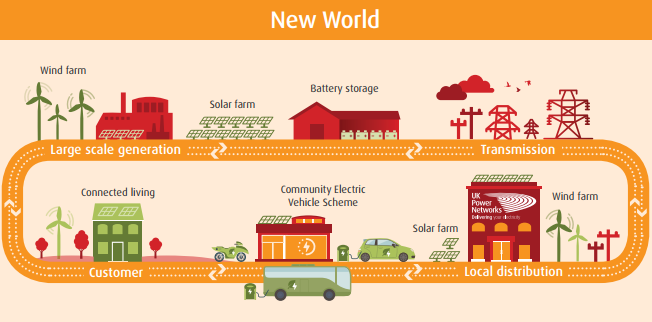UK Power Networks (UKPN) has today unveiled its own transitional plan to become a distribution system operator (DSO) amidst “radical changes” to the UK’s power market.
The distribution network operator (DNO) for London, the South and South East has become the latest operator to detail how it expects such a transition to occur, following in the footsteps of Western Power Distribution which did the same late last month.
UKPN has sought to set the scene of a rapidly evolving electricity market, with significant deployment of decentralised power, more involved and educated consumers and far greater flexibility within the network from electric vehicles, battery storage, renewables and demand side response.
More than 8.5GW of renewables capacity is connected to the distribution grids presided over by UKPN, with a further 3.6GW of capacity awaiting connection. On top of that, it has received more than 16GW of applications for battery storage assets in its area of operation.
With such activity continuing to occur, UKPN said it was now time for DNOs to both empower and enable communities and consumers to benefit from new and future technologies and a “two-way flow of power” that is markedly different from the status quo.
This will result in what UKPN has described a “very different distributed energy world” that will take place by 2030, with the operator’s transition to a DSO model highlighted as crucial to enable that evolution.
The transition to a DSO would require “substantial” investment UKPN said but unlike Western Power Distribution it did not attach any estimated value to the required outlay.
Instead the operator said its transition would occur in two broad phases, the first of which is already underway. Dubbed the ‘emergent DSO’ phase, UKPN expects to use this time to gradually adopt new roles and responsibilities as the energy landscape changes. This will in turn lead to a second, ‘full DSO’ phase in which UKPN would expand its role to include whole system optimisation.
UKPN also broke this down into three more specific timeframes occurring throughout this year, between 2018 and 2023 and then a third phase taking place from 2023 until 2030.
Its first phase would see UKPN offer cheaper and quicker grid connections to distribution generation assets such as solar and onshore wind; using customer flexibility (demand side response, for example) as an alternative to costly grid reinforcement works; enhance its own system operator capabilities; and prepare for and facilitate the uptake of EVs.
UKPN has already been testing ways in which it can facilitate more renewable energy generation connecting to grid, including smarter grid processes. These adjustments, first announced last month, have so far enabled 20 generators with a total capacity of 110MW to connect to the grid without the need of reinforcements that would have otherwise cost £70 million.
UKPN’s definition of a DSO
UKPN also raised the potential for the wholesale power market to change to include “greater locational resolution”, and spoke of reformed Use of System Charging and more localised flexibility platforms.
It has followed WPD into procuring its own flexibility services, potentially justifying greater deployment of battery storage and demand side response technologies. Having already signed a contract with aggregator Limejump to procure those services itself from the Leighton Buzzard battery project, UKPN could now take this capacity to National Grid tenders, allowing regionalised assets to benefit from national markets.
Market participant roles are also expected to change widely, with so-called prosumers, aggregators, ESCOs and flexibility services featuring prominently.
Basil Scarsella, chief executive at UKPN, said the country was on the verge of a change “as significant for electricity as the advent of broadband was for telecommunications”.
“We are working with policy makers, regulators, academia, SMEs and importantly customers to lay the foundations for an exciting future, which will place customers in control of energy usage. We’re doing the work now to make this exciting future possible,” he said.





